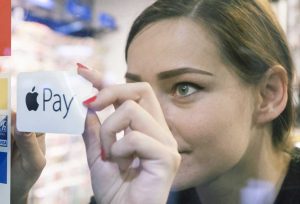Coveted word-of-mouth advertising is failing the mobile-payments services offered by technology giants. That’s the assessment from the Q1-2018 Mobile Pay Tracker report from Auriemma Consulting Group.
Though 34% of consumers among the more than 1,500 surveyed use mobile payments—up five points from a year ago—not many are as willing to recommend Apple Pay, Google Pay, or Samsung Pay to others. Forty-two percent would not recommend the services. That’s an increase from 31% a year ago.
Why is that happening? Issues at the checkout remain a factor. “It’s up to the Pay providers to take feedback and offer resolution on technical issues, but merchants play a large role in the experience, particularly managing customer expectations,” Jaclyn Holmes, a director at New York City-based Auriemma, says in an email to Digital Transactions News.

Simple steps, such as training sales staff or identifying mobile-payment acceptance, may help. “It seems simple, but even signage can have a substantial impact,” Holmes says “If there’s signage that states the store accepts mobile payments, customers are going to expect their mobile payment will go through. Conversely, many customers will only try their mobile Pay if there’s a sign at the register. Being able to identify an increasing number of locations, and having consistent, successful transactions is critical for a lift in adoption.”
Merchants with their own mobile-payments services, however, have advantages over the tech-based ones. They control the messaging, have guaranteed acceptance in their stores, and offer a uniform in-store experience, she says.
For Apple Pay, Google Pay, and Samsung Pay, reported issues at the point-of-sale are the same as last year, Holmes says.
What can these brands do to boost their recommendations from users? “Consumer likelihood to recommend tends to align with the frequency of usage—more usage presents more opportunities to share one’s experiences (whether good or bad),” Holmes says. “As we know, Samsung Pay has the greatest in-store merchant acceptance of the three, and their users describe themselves as the most active. While there’s been a decline across the board, theirs has been gradual, and they continue to score the highest [net promoter score].” The net promoter score measures the loyalty of a firm’s customers.
Samsung Pay also has its own rewards program, which Holmes says has been “very well-received.”






